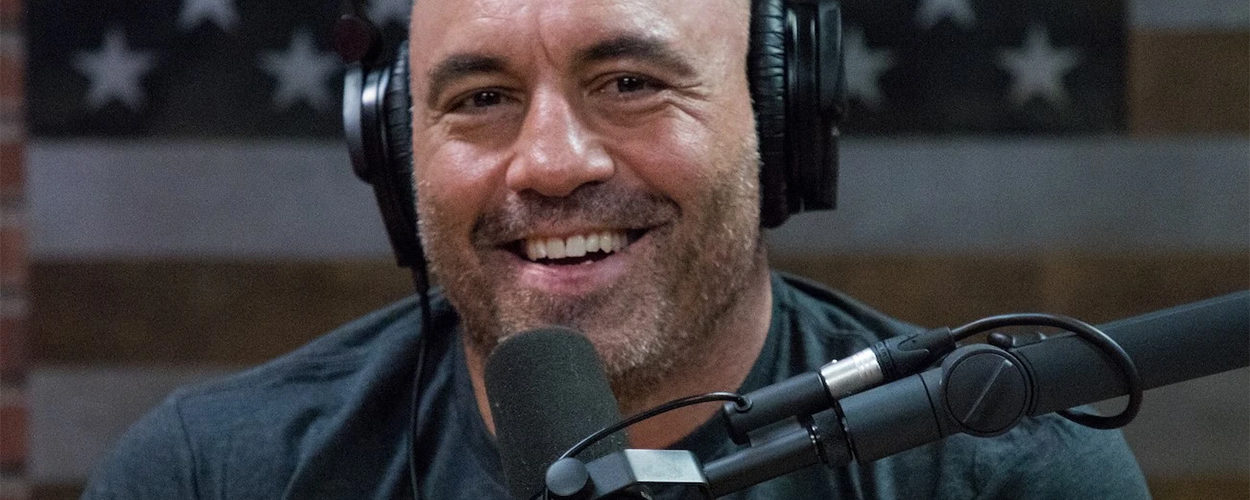This website uses cookies so that we can provide you with the best user experience possible. Cookie information is stored in your browser and performs functions such as recognising you when you return to our website and helping our team to understand which sections of the website you find most interesting and useful.
Business News Digital Media
Over 250 scientists and medics hit out at Spotify over Joe Rogan podcast
By Chris Cooke | Published on Friday 14 January 2022

Spotify is feeling some heat from an entirely new group of critics this week. But this has nothing to do with rights and royalties, nor payola and privacy. No, this is a matter of life and death. And relates to that Joe Rogan and his Spotify-exclusive podcast.
The Joe Rogan Experience, see, has “a concerning history of broadcasting misinformation, particularly regarding the COVID-19 pandemic”. And “by allowing the propagation of false and societally harmful assertions, Spotify is enabling its hosted media to damage public trust in scientific research and sow doubt in the credibility of data-driven guidance offered by medical professionals”.
This is according to an open letter to Spotify signed by 260 scientists, medical professionals, professors and science communicators, who were prompted to complain now about Rogan’s frequent misleading wafflings about the coronavirus following a recent edition featuring controversial COVID vaccine critic Dr Robert Malone.
But that interview, at the end of December, “is not the only transgression to occur on the Spotify platform, but a relevant example of the platform’s failure to mitigate the damage it is causing”, the scientists and medics say.
“We are calling on Spotify to take action against the mass-misinformation events which continue to occur on its platform”, they go on. “With an estimated eleven million listeners per episode, the Joe Rogan Experience is the world’s largest podcast and has tremendous influence. Though Spotify has a responsibility to mitigate the spread of misinformation on its platform, the company presently has no misinformation policy”.
Going into more detail about Rogan’s record in this domain, the letter says: “Throughout the COVID-19 pandemic, Joe Rogan has repeatedly spread misleading and false claims on his podcast, provoking distrust in science and medicine. He has discouraged vaccination in young people and children, incorrectly claimed that mRNA vaccines are ‘gene therapy’, promoted off-label use of ivermectin to treat COVID-19 (contrary to FDA warnings), and spread a number of unsubstantiated conspiracy theories”.
As for the recent Malone interview, it adds: “Malone used the JRE platform to further promote numerous baseless claims, including several falsehoods about COVID-19 vaccines and an unfounded theory that societal leaders have ‘hypnotised’ the public. Many of these statements have already been discredited. Notably, Dr Malone is one of two recent JRE guests who has compared pandemic policies to the Holocaust. These actions are not only objectionable and offensive, but also medically and culturally dangerous”.
“The average age of JRE listeners is 24 years old and according to data from Washington State, unvaccinated 12-34 year olds are twelve times more likely to be hospitalised with COVID than those who are fully vaccinated”, it continues. “Dr Malone’s interview has reached many tens of millions of listeners vulnerable to predatory medical misinformation. Mass-misinformation events of this scale have extraordinarily dangerous ramifications”.
“As scientists, we face backlash and resistance as the public grows to distrust our research and expertise. As educators and science communicators, we are tasked with repairing the public’s damaged understanding of science and medicine. As physicians, we bear the arduous weight of a pandemic that has stretched our medical systems to their limits and only stands to be exacerbated by the anti-vaccination sentiment woven into this and other episodes of Rogan’s podcast”.
The letter then concludes: “This is not only a scientific or medical concern; it is a sociological issue of devastating proportions and Spotify is responsible for allowing this activity to thrive on its platform. We, the undersigned doctors, nurses, scientists, and educators thus call on Spotify to immediately establish a clear and public policy to moderate misinformation on its platform”.
We await Spotify’s response. Efforts to silence vaccine critics always lead to claims of censorship, of course, which puts Spotify in a tricky position, especially when working with a personality whose mass appeal long preceded his tie-up with the streaming firm. However, having chosen to become a media owner through its exclusive podcasts, it probably needs more clear policies on how it deals with any one controversial opinion – or outright misinformation – that pops up on its platform.
CMU Insights recently collaborated with content and platform security company Friend MTS on a white paper looking at the challenges digital companies face in tacking misinformation and other harmful content, while also seeking to protect freedom of speech. You can download a free copy here.





